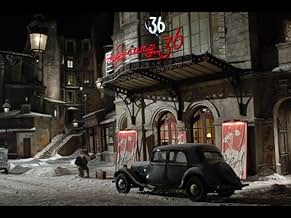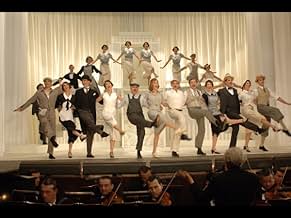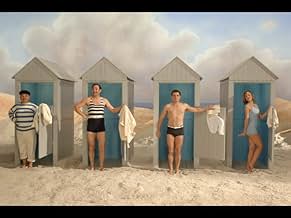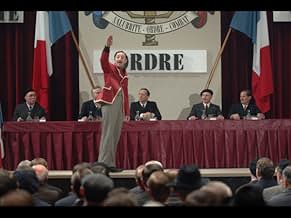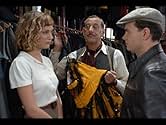IMDb रेटिंग
6.5/10
3 हज़ार
आपकी रेटिंग
अपनी भाषा में प्लॉट जोड़ेंWhen Chansonia, a nightclub, is shut down by the landlord, the stage manager Pigoil is forced to look for a new job. He finds hope when he discovers a young woman with a lovely singing voice... सभी पढ़ेंWhen Chansonia, a nightclub, is shut down by the landlord, the stage manager Pigoil is forced to look for a new job. He finds hope when he discovers a young woman with a lovely singing voice.When Chansonia, a nightclub, is shut down by the landlord, the stage manager Pigoil is forced to look for a new job. He finds hope when he discovers a young woman with a lovely singing voice.
- 1 ऑस्कर के लिए नामांकित
- 3 जीत और कुल 7 नामांकन
फ़ीचर्ड समीक्षाएं
It's difficult to explain this film's charm, but suffice it to say that if you love Paris and films about it, this portrayal of the city in 1936 will sweep you off your feet. At two hours long and in French, the movie may seem off-putting at first, but go with the flow and savor the fine direction, cinematography, sets, and the original music by Christophe Barratier. The story takes place in and around a Paris music hall, the proprietor of which has been charged with murder; during his confession we learn the story of the music hall in flashback performances. Even the kindest critics dismissed the film as what one called "a gleaming hunk of French period schmaltz." Exactly what I liked about it.
This is not a great film, a masterpiece of cinema-as-art. It is, however, a wonderful movie that will delight you while you watch it and leave you with many happy musical memories after it has finished.
Though the director and star are the same, this movie does not resemble Les Choristes. It is, instead, an homage to French popular music of the 1930s (and 1940s). If you don't know that music and the stars who made it famous, you'll miss the many references. The movie will still be enjoyable, but it won't evoke the memories (and pleasures) that it would to French viewers over 60.
The music, most of it original, nevertheless comes very close to pastiche of popular numbers from that era. (One repeated number is very close to Messager's "Clou clou," which I think is from his Véronique.) The performances and characters also allude to stars of the past, though not necessarily in a one-on-one way. There is the music hall singer Tony Rossignol, whose light lyric tenor recalls Tino Rossi, though his Spanish get-up and music recalls Luis Mariano. Kad Merad's character starts out doing terrible impressions, of animals and Fernandel. He finally has a hit when he starts singing like Charles Trenet. Even though the music is pastiche, it is sometimes very catchy, and very much caught me up.
One of the previous reviewers said that Clovis Cornilliac was made up as Jean Gabin but couldn't reproduce the latter's charisma. I hope he was not meant to recall Gabin, because he certainly doesn't. He's pleasant in his role, as is the female lead, but the star is definitely Gerard Jugniot, who gives yet another first-rate performance.
This won't make the viewing list for any course on French cinema, nor should it. But you'll definitely enjoy it.
P.S. I watched this movie again, about a year after my first viewing of it. While I still found it enjoyable, I realize, in rereading my review, that it was the last part, with all the music, that made the strong impression on me. One of the reviews written since my first one notes that the movie might have been more memorable if there had been more music spread throughout it, and I agree. The show the company originally stages is bad vaudeville, and bad vaudeville numbers have only limited appeal. The subplot concerning Galapiat and the French fascists is somehow disconnected from the rest. Having subsequently seen that same actor, Bernard-Pierre Donnadieu, in L'affaire Salengro, where he played someone on the other side of that fight, I realize how much better the issue could have been presented.
The film is definitely worth watching, and should please most viewers. Gérard Jugnot gives yet another very fine, very moving performance. I don't know how well it will repay repeated viewings, however. I don't know if I would want to watch it myself a third time.
Though the director and star are the same, this movie does not resemble Les Choristes. It is, instead, an homage to French popular music of the 1930s (and 1940s). If you don't know that music and the stars who made it famous, you'll miss the many references. The movie will still be enjoyable, but it won't evoke the memories (and pleasures) that it would to French viewers over 60.
The music, most of it original, nevertheless comes very close to pastiche of popular numbers from that era. (One repeated number is very close to Messager's "Clou clou," which I think is from his Véronique.) The performances and characters also allude to stars of the past, though not necessarily in a one-on-one way. There is the music hall singer Tony Rossignol, whose light lyric tenor recalls Tino Rossi, though his Spanish get-up and music recalls Luis Mariano. Kad Merad's character starts out doing terrible impressions, of animals and Fernandel. He finally has a hit when he starts singing like Charles Trenet. Even though the music is pastiche, it is sometimes very catchy, and very much caught me up.
One of the previous reviewers said that Clovis Cornilliac was made up as Jean Gabin but couldn't reproduce the latter's charisma. I hope he was not meant to recall Gabin, because he certainly doesn't. He's pleasant in his role, as is the female lead, but the star is definitely Gerard Jugniot, who gives yet another first-rate performance.
This won't make the viewing list for any course on French cinema, nor should it. But you'll definitely enjoy it.
P.S. I watched this movie again, about a year after my first viewing of it. While I still found it enjoyable, I realize, in rereading my review, that it was the last part, with all the music, that made the strong impression on me. One of the reviews written since my first one notes that the movie might have been more memorable if there had been more music spread throughout it, and I agree. The show the company originally stages is bad vaudeville, and bad vaudeville numbers have only limited appeal. The subplot concerning Galapiat and the French fascists is somehow disconnected from the rest. Having subsequently seen that same actor, Bernard-Pierre Donnadieu, in L'affaire Salengro, where he played someone on the other side of that fight, I realize how much better the issue could have been presented.
The film is definitely worth watching, and should please most viewers. Gérard Jugnot gives yet another very fine, very moving performance. I don't know how well it will repay repeated viewings, however. I don't know if I would want to watch it myself a third time.
Go to IMDb.com and enter the title: "Paris 36" and what do you get?... VOILA! "Faubourg 36"! Therein lies the problem: Apparently, someone set out to make one movie...and ended up making a completely different one! This bizarre Paris/Faubourg dichotomy plagues the movie throughout, but particularly during the last half!
"Paris" did, however, get off to a relatively good start...Showing a lot of promise, in a number of different areas: The inter-action between lead characters seemed brisk and focused; the sets had a very authentic mid-30's Paris look and feel; Music that had just the right mix of melancholy, nostalgia and pre-war glibness and sung with just the right inflection and ring; and different back stories...But it all started sputtering about half way through. The last half was a total mess. Absolutely nothing worked! I can't imagine what was going though Writer/Director Christophe Barratier's mind, as he pressed on with this project!
As "Paris" progressed, the characters' actions became constantly more erratic, unpredictable and demonstrated a continually escalating degree of incongruity with the personality and motives of each character. Protagonists capriciously waltzed in and out of the movie, with little or no explanation. Because of this, the last half of "Paris" takes on a dues ex machine tainted storyline much more akin to a fairy tale or the romantic daydreams of a 14 year-old Parisian girl. 2**
"Paris" did, however, get off to a relatively good start...Showing a lot of promise, in a number of different areas: The inter-action between lead characters seemed brisk and focused; the sets had a very authentic mid-30's Paris look and feel; Music that had just the right mix of melancholy, nostalgia and pre-war glibness and sung with just the right inflection and ring; and different back stories...But it all started sputtering about half way through. The last half was a total mess. Absolutely nothing worked! I can't imagine what was going though Writer/Director Christophe Barratier's mind, as he pressed on with this project!
As "Paris" progressed, the characters' actions became constantly more erratic, unpredictable and demonstrated a continually escalating degree of incongruity with the personality and motives of each character. Protagonists capriciously waltzed in and out of the movie, with little or no explanation. Because of this, the last half of "Paris" takes on a dues ex machine tainted storyline much more akin to a fairy tale or the romantic daydreams of a 14 year-old Parisian girl. 2**
If this film had been produced 60 to 70 years ago,it probably would have been directed by Jean Renoir and starred Jean Gabin as one of the central figures. 'Faubourg 36' (or as it is being distributed in English speaking countries as 'Paris 36')is a film that takes place in Paris, just before world war 2,when political tensions were at a boiling point between left leaning French & their ultra conservative right wing counterpoint (which would eventually embrace the Nazi party in Germany,especially when Hitler marched into Paris in the 1940's). A (failing)theatrical troupe,bent on preserving their beloved theater tries to pull things back together,they get support from some of the locals (including an alleged Communist,who claims he was in the Red Brigade in Russia),a young lass trying to break into the singing profession,a (mostly)unfunny comic & enough well meaning persons to try and bring things together. A corrupt local political figure,who wants to do little more than bring the ruination of the theater also looms. The film is complimented by a cracker jack cast of French professionals who turn in a splendid job of acting. The screenplay, although something of an overstuffed sandwich of sorts,is still well played out. The film features several songs,most of which are performed by the cast,themselves. At times,this film has a Busby Berkley feel to it (which is not a bad thing). In French with English subtitles. Rated PG-13 by the MPAA,this film contains a bit of rude language,some suggestive material that parents of very young children may not appreciate,and some violence (but nothing too gory that could disturb some sensitive audiences). Well worth a look.
Nora Arnezeder reminds me of movie stars of the thirties : beautiful, charming, she can sing, dance, act... Star quality ! As for the film itself, the story is rather simple, which I come to realize, is often what makes it good. It's not so much what the story is about but rather how you tell it. And in that case, you get to laugh, cry, you care about that Pigoil who looses his job, his wife and even his son and who doesn't lose hope, about Milou and Douce's love story. You'll love the great new songs, the homage to Busby Berkeley, Jacky's lousy jokes (a reprise of Kad's own TV skit) and secondary characters played by first-rate comedians like François Morel and the great Pierre Richard. What's not to like ?
क्या आपको पता है
- ट्रिवियाFaubourg is not French for "the district." It is a contraction of "faux bourg", French for "false town" and were used to designate smaller towns attached to larger towns or cities. A lot of these faubourgs were independent cities until they were attached to Paris and lost all independence around during the 17th and 18th century. A new outer wall was later erected around the city. These faubourgs, especially those on the East side, were usually blue collar, with a very active night life.
- गूफ़When Jacky accidentally turns on the radio while Pigoil is talking to his wife and her new lover, the radio is very loud immediately after Jacky flips the switch. On this type of old tube amplified radio, it would take several seconds for the tubes to heat up and amplify any signal, and the volume would go up very slowly.
- कनेक्शनFeatured in The 82nd Annual Academy Awards (2010)
टॉप पसंद
रेटिंग देने के लिए साइन-इन करें और वैयक्तिकृत सुझावों के लिए वॉचलिस्ट करें
- How long is Paris 36?Alexa द्वारा संचालित
विवरण
- रिलीज़ की तारीख़
- कंट्री ऑफ़ ओरिजिन
- आधिकारिक साइटें
- भाषा
- इस रूप में भी जाना जाता है
- Paris 36
- फ़िल्माने की जगहें
- Surtainville, Manche, फ़्रांस(beach scenes by the end)
- उत्पादन कंपनियां
- IMDbPro पर और कंपनी क्रेडिट देखें
बॉक्स ऑफ़िस
- US और कनाडा में सकल
- $8,51,540
- US और कनाडा में पहले सप्ताह में कुल कमाई
- $44,690
- 5 अप्रैल 2009
- दुनिया भर में सकल
- $1,29,40,622
- चलने की अवधि
- 2 घं(120 min)
- रंग
- ध्वनि मिश्रण
- पक्ष अनुपात
- 2.35 : 1
इस पेज में योगदान दें
किसी बदलाव का सुझाव दें या अनुपलब्ध कॉन्टेंट जोड़ें





